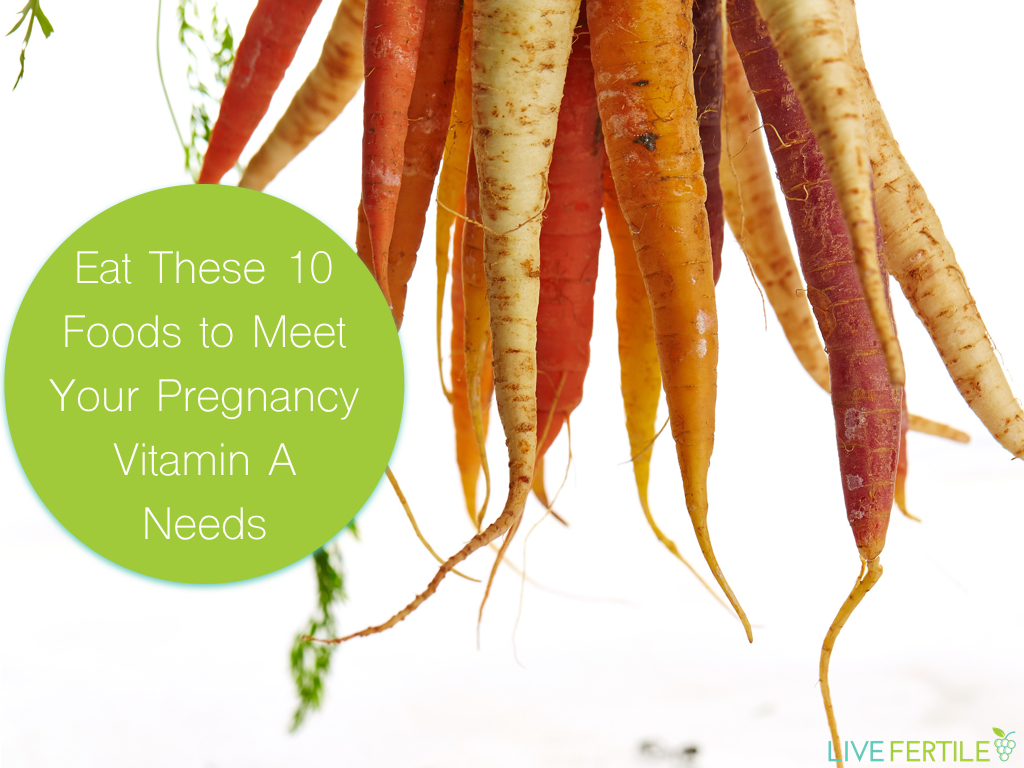10 Tasty Foods To Meet Your Pregnancy Vitamin A Needs
Vitamin A gets a bad rap during pregnancy. Rightfully so, folks are concerned about toxicity. This is one nutrient where too much of a good thing can be harmful. But, I think we've really thrown the baby out with the bathwater with this one. Yes, too much vitamin A, especially from supplements and polar bear liver ('cause you know, we're all noshing on loads of polar bear liver...), is dangerous. But you still need it, your baby still needs it, and there's a really good chance you're not getting enough of it.
26% of pregnant women don't get enough vitamin A from their daily diet. And non-pregnant women aren't doing any better. 48 % of non-pregnant women aren't meeting their vitamin A needs. So maybe we should all relax a bit on those vitamin A warnings.
Too much vitamin A is not good, but neither is too little. And if you know which forms to take in, you don't have to worry nearly as much about the effects of getting much.
How Much Vitamin A Do You Need During Pregnancy
Recommended Dietary Allowance During Pregnancy:
770 mcg/ day
How Much Should Be in a Prenatal Vitamin:
Vitamin A is usually reported in IU (international units) on supplement labels. If all the vitamin A is from beta carotene, up to 15,000 IU is allowed (though, not advised), but you probably won't find it that high anyway. If your vitamin contains retinyl palmitate or retinyl acetate, there shouldn't be more than 2,500 IU from these two.
Best Form of Vitamin A in a Prenatal:
Food based or food created. Beta carotene is a safe bet. Retinyl palmitate or retinyl acetate are fine, but there shouldn't be more than 2,500 IU of vitamin A coming from them.
The truth about vitamin A during pregnancy
Pregnancy is an anabolic state. Which is just a fancy way of saying a time of building, multiplying, and growth. For cells to grow and multiply- which is precisely what's happening during pregnancy- your body and your baby's body needs enough vitamin A.
Vitamin A is also a very powerful antioxidant. Your body depends on it, along with other antioxidants, to protect your cells from damage from things like pollution, uv rays, and emotional stress.
If vitamin A is so important and so many women don't get enough of it, why are women constantly warned to avoid it?
Because certain types, in high amounts really can be very dangerous.
Beta-Carotene vs Preformed Supplemental Vitamin A vs Animal Sources
Beta-carotene, the type of vitamin A in fruits and vegetables, is perfectly safe, even in high amounts.
With Vitamin A from animal sources, it's possible to get too much. Though it's highly unlikely for most people following the standard American diet to get too much vitamin A from animal sources. Seriously, when was the last time you went hog on liver and other offal? Still, I would be remiss to not at least mention it.
Now, large doses of synthetic vitamin A or preformed vitamin A in supplements are absolutely dangerous. Not only can they cause harm to you, but also your baby. They are teratogens, meaning they can cause birth defects. So they should definitely be avoided during pregnancy. Really, in large amounts, it's something to avoid any time, pregnant or not.
It's important to realize, most of the research about vitamin A toxicity isn't about vitamin A from food sources. Most vitamin A toxicity reports come from supplemental vitamin A, especially from preformed (retinol and retinyl) forms. One more reason to focus on getting your nutrients from real food instead of supplements.
10 Vitamin A Rich Foods
- Liver (just make sure not to overdo it.)
- Sweet Potato
- Pumpkin
- Butternut Squash
- Carrots
- Spinach
- Collard Greens
- Kale
- Dried Apricots
- Mustard Greens
Ways to Squeeze More Vitamin A in Your Day
- Add ground liver to your ground meat used for hamburgers, tacos, or spaghetti sauce
- Opt for mashed sweet potatoes in place of mashed white potatoes as a side dish for dinner
- Grab a bowl of pumpkin soup for lunch
- Add butternut squash to your favorite pasta sauce recipe
- Sprinkle shredded carrots on a salad, on scrambled eggs, or on a sandwich
- Choose spinach instead of iceberg lettuce in salads or on sandwiches
- Use a collard green leaf in place of a tortilla or wrap when making wraps for lunch
- Rip up kale leaves and add them to an omelet
- Make your own tasty, healthy, and easy trail mix by combining dried apricots, coconut flakes, and dark chocolate
- Blend mustard greens into your favorite smoothie recipe
Add these and other vitamin A rich foods to your daily diet to meet your vitamin A needs for a strong immune system, healthy skin, and a healthy pregnancy.
Sources:
